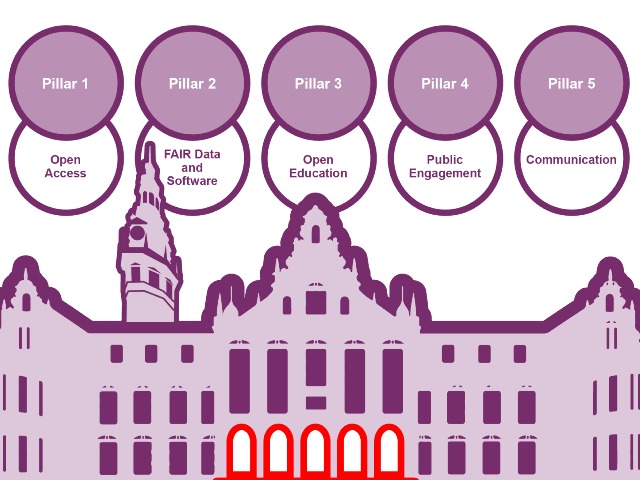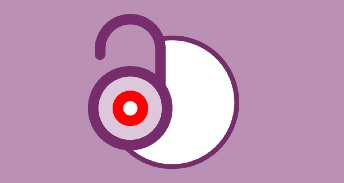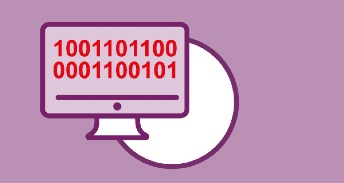The UG opens up - Looking back at the Open Science Programme 2021-2023

The University of Groningen (UG) is committed to cultivating a transparent and open scientific and educational environment. To stimulate this, the UG launched the Open Science Programme (OSP) in 2021.*
Five focus areas, known as pillars, were established and the pillar teams successfully achieved all 27 deliverables that were drawn up at the start of the programme. In this blog post we highlight some of these successes per pillar. For a complete overview of the accomplishments of the OSP, visit the website.
Pillar Open Access (OA)

To be able to reach the aim for unrestricted immediate access to research publications, the Open Access pillar (consisting of colleagues from the UB and Medical Library) successfully accomplished:
-
an FAQ to help researchers comply with funders’ open access requirements,
-
the development and implementation of an incentive fund for open access books,
-
the development and implementation of a support fund for diamond open access initiatives,
-
a large-scale implementation of the Taverne Amendment.
The Open Access book fund received 66 applications, of which 47 were granted. In addition, the Diamond Open Access fund received 10 applications by diamond journals led by UG staff, all of which were granted. The budget of both funds was depleted before the end of the intended deadline, showing that there’s a clear demand for support for open access books, as well as for community-driven/non-for-profit publication venues. Furthermore, the large-scale implementation of the Taverne regulations led to a significant rise in the UG’s open access uptake, which resulted in the UG being the global leader in the field of open access according to the CWTS Leiden Ranking 2023.
Pillar FAIR data and software (FAIR)

Colleagues of the UG and UMCG Digital Competence Centre (DCC) collaborated on deliverables to facilitate FAIR (Findable, Accessible, Interoperable and Reusable) research data and software. The FAIR principles help to make science better reproducible, more efficient and more trustworthy: The team accomplished the following:
-
Practical guides for researchers on how to make research data and software FAIR.
-
Guidelines for how to publish open data and data with restricted access, including instructions for defining Terms of Use.
-
Sharing ‘open’ best practices, by conducting interviews with data stewards and researchers on good practices for FAIR data management
-
A regular webinar open to all UG staff and students on open science and FAIR research data (‘Principles of hands-on data management’)
-
A practical guide on how to de-identify research data, specifically for researchers who work with personal data (published on the DCC-website, see also the flyer). Based on this guide, the DCC has also developed a de-identification workshop that is being offered in Research Master programmes.
Pillar Open Education (OE)

The aim of this part of the programme was to encourage and support teachers in adopting, adapting and creating open educational resources (OER) and reviewing existing teaching practices. While, for instance, the focus on open access has been around for several years, the focus on open education in European higher education has just emerged. Due to the collaboration of the UB, ESI/CIT and US, this cross-departmental team successfully accomplished (among others):
-
developing and conducting a large number of educational activities (including 13 training sessions: 7 in-person workshops, 4 webinars, and 2 micro-labs) with topics ranging from general OER introduction to integrating open pedagogy in course design and fostering student engagement,
-
institutionalising open textbook publishing in close collaboration with the University Groningen Press (UGP) and publishing several open textbooks by UG authors,
-
establishing a network of 11 open education faculty contact persons and organising several faculty-tailored sessions on open education,
-
creating a curated list of 350 OER sources and collections, developing guidelines for teachers on engaging with open education, and launching an open education website,
-
implementing technical infrastructure for hosting, sharing and creating OER (SURF Sharekit/edusources and Pressbooks).
Pillar Public Engagement (PE)

One of the goals of open science is to achieve maximum societal impact and to create opportunities for researchers to engage with societal partners, the general public, as well as with fellow researchers, teachers and students. The Public Engagement Pillar team, consisting of UG and UMCG experts on societal engagement, worked hard to make this a success. Here are some our most impactful accomplishments:
-
establishing the UG’s PE community which now organises regular meetings with different parties like the Science Shops, University Museum, Science LinX/FSE, Studium Generale, Communication Departments, Alumni Relations and other Public Engagement facilitators at e.g. UMCG and Aletta Jacobs School of Public Health,
-
developed and executed a Public Engagement Seed Fund, which funded 9 societally engaged projects, acknowledging UG and UMCG staff members engaged in public engagement (PE) activities and encouraging others to do the same.
-
organized 8 training sessions for researchers, on a variety of topics ranging from scientific storytelling to podcasting, all with the goal of increasing the impact of research and engagement of the public.
The team also wrote the firstUG Vision on Public Engagementwhich states the commitment and strategy of the UG to contribute to societal challenges. With that framework in place, we are enthusiastic to continue turning this vision a reality.
Pillar Communication (Comms)

The team of the pillar Communication (a collaboration between the communications departments of the UB, the CIT, the UMCG and the US) generated and raised awareness about open science at the UG. They successfully:
-
increased the awareness about OSP by utilizing communication tools such as the Open Science Newsletter and the Open Science Blog,
-
engaged with the academic community through social media; the pillar's Twitter takeover of the central account UG_spotlight was an example (the pillar's tweets garnered 35,000 impressions (views) within one week),
-
created the new podcast series "Open Science Bites"
-
developed various promotional materials for other pillars,
-
organised the Open Research Award together with the OSCG in 2021, 2022 and 2023.
Open Science Community Groningen (OSCG)
The Open Science Community Groningen (OSCG) is a grassroots community that brings together scientific staff and provides advice, support, and training for those who want to engage in open science.
The OSCG welcomed a new chair and created a new and better functioning website, using the allocated budget of the Open Science Programme. Furthermore, they co-organize the Open Research Award together with the communications team, and organise several ongoing successful events that attract new staff members and disseminate open science principles and practices within the research and teaching community.
Conclusion
The OSP 2021-2023 has laid a solid foundation for the transition to open science, by putting infrastructure and support firmly in place for all five pillars. The programme has also made connections within faculties to facilitate and encourage uptake and implementation of open science practices. We are ready to move forward by engaging staff and students across all faculties to make open science an integral part of the UG’s research and teaching culture.
* The Open Science Programme is a collaborative effort between the University Library (UB) and the Medical Library, the Center for Information Technology (CIT), Digital Competence Centre (DCC), University Services (US), UG faculties and the Open Science Community Groningen (OSCG).


